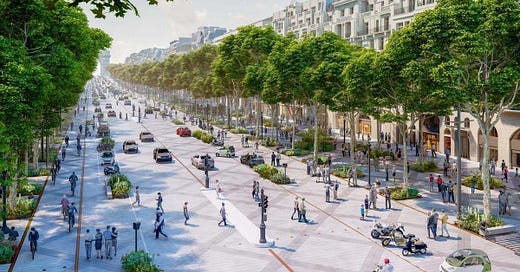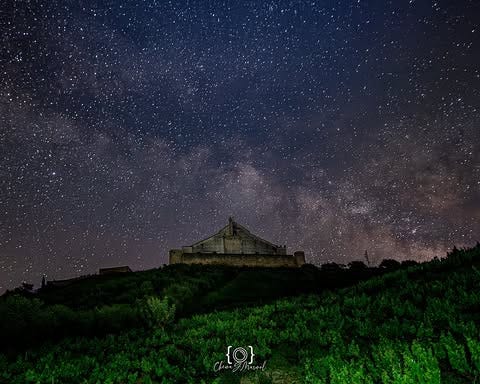Spanish Media Pushes For WEF 15-Minute Cities After Massive Blackout And Grid Failure
Problem. Reaction. Solution.
As Spain and Portugal have temporarily recovered from the massive power outage last month that plunged around 50 million into darkness, and engineers and investigators look to pick up the pieces from the grid failure, some outlets are using the opportunity to promote the benefits of the World Economic Forum’s (WEF) so-called 15-minute cities.
The outage has renewed questions about the reliability of renewable energy as it was fairly quickly ruled-out that a cyberattack was the cause of the blackouts.
But the WEF, in a recent post, still used the opportunity to say the threat of cyberattacks is real, and the odds of one are increased because of the fragility of renewable sources. The group noted:
Moreover, the evolution of technology has reshaped the electricity industry, ushering in smarter grids, the integration of renewable energy and improved operational efficiencies. These advancements, however, have increased the complexity of the electricity supply chain, creating new set of challenges, particularly in safeguarding these intricate systems from cyber threats.
The increasing interdependencies among power systems across borders and the escalating sophistication of cyberattacks further increase the complexity on the governance and actions when a crisis disrupts.
Though the outages were highly disruptive and inconvenience, many Spaniards took to the streets and parks to enjoy each other and interact with the community.
Modern Met reported:
Once the lights came back on, images captured during these trying hours made their way to social media. Clips and pictures showed the Spaniards' resilience, doing things such as navigating stores in the dark and turning to paper maps to get around. The most alluring ones showed more than perseverance, though; they revealed some laid-back fun. With many being unable to work, study, or simply get to where they needed to go, they found themselves hanging out with other people and relaxing in all different parts of the country.
From limbo competitions to conga lines, dancing seemed to be a popular way to pass the time. This also allowed them to engage and make friends with people they may have never crossed paths with if not for the power outage. One video shows a man playing the guitar while surrounded by his pals, another captures how ping pong tables and chess boards were brought out onto the streets.
As the night fell, an even more unusual sight took over. Due to the lack of light pollution, the stars came out, giving many a chance to stargaze and this inspired astrophotographers to grab their cameras. Photographer Chema G. Marmol shot the night sky in Montilla, a town where it took over 24 hours for power to be restored.
In the wake of this, Spanish media is now using this as an opportunity to encourage the transition into the WEF’s so-called 15-minute cities; autonomous smart cities that are car-less, with heavy emphasis on communal and shared living as perpetual renters and not owners. They are touted as fighting climate change as well.
In a 2023 piece written by Bloomberg, the publication described what a 15-minute city is and how “conspiracy theorists” were reacting:
The term was initially coined in 2016 by Carlos Moreno, a professor at the Sorbonne in Paris, as a way of rethinking urban planning. In his original vision, nobody would be more than a short walk from essential services like doctors, shops or even their job. The idea had been adopted by several cities around the world, with the Mayor of Paris one of its most high-profile supporters, before the first conspiratorial posts began appearing in late 2022.
It is not a totally new idea; neighborhoods around the world that predate the mass adoption of the car were historically built this way. The modern concept has been recently promoted as part of efforts to reduce reliance on driving, especially in busy, congested places, and create more pleasant, self-sufficient communities.
A coalition of anti-vaxxers, conspiracy theorists and far-right influencers have positioned the 15-minute city concept as a totalitarian plot. Social media posts have suggested the idea is part of a broader scheme by international bodies like the World Economic Forum, a frequent target for conspiratorial narratives. These groups often make false claims about the policy, like the idea that people will be stopped from traveling more than 15 minutes away from their home.
These cities do not necessarily have to be “fifteen minutes,” they could instead be “20-minute cities” that provincial governments are subsidizing in Australia, or it could be extra small and be a “5-minute city” like the one being constructed in Arizona, U.S., right now. Just recently the Edmonton city council in Canada approved its new district policy and plans for 14 districts to construct their 15-minute city. Professor Sandeep Agrawal of the University of Alberta’s School of Urban and Regional Planning besmirched the idea that people would be “locked” into their confined space as “a total myth.” “It’s disinformation that is floating around. There’s not an iota of truth to it,” Agrawal said.
El Economista reported last week (translated to English): “The city of 15 min as a solution to avoid collapses like those of the blackout last Monday.” The author wrote the following:
Greenpeace, Ecologists in Action and ConBici have defended 'the city of 15 minutes' after this Monday's images of people walking for hours to return home due to the blackout that affected the Iberian Peninsula. This movement advocates that all the necessary services for a person are 15 minutes from their home walking or cycling, from your work to your reference health center.
"This implies then that the public space is redesigned and the car loses authority that it has ", highlighted in statements to Europa Press the person in charge of the Greenpeace mobility campaign, Cristina Arjona.
In his opinion, a new "daily hierarchy" would be created in which mobility on foot would be favored and in which streets would be "greener and wider". In addition, coexistence between citizens would be improved. In view of the images that could be seen yesterday, with floods of people through some of the main arteries of the country, such as Paseo de la Castellana in Madrid, and crowded terraces and parks, he said that it was possible to see how people "want aspire "to the model of 'the city of 15 minutes'.
"We saw how many people took to the streets, related to the neighbors, made most of the trips in an environment close to where they lived. On the other hand, we also saw how a large part of the population had to make huge movements on foot (...) because the design of cities has been favored in which work is getting further and further of the area where we reside, and because also the entire city model has been focused on the car, "he explained.
In his opinion, progress should be made towards the "compact" model of the city and towards the "mix of uses". Among other examples, he has indicated how schools could open in the afternoon as study centers or sports spaces. "Let's take advantage of the spaces that already exist in cities to give them more uses," he emphasized.
In addition, it has urged that this mix of uses be favored and that urban planning and mobility "must go hand in hand" when planning new homes.
One of the coordinators of Ecologists in Action, Carmen Duce, has indicated in statements to Europa Press that they defend 'the city of 15 minutes' because it seems "reasonable", but that on Monday it was possible to see how it is "fundamental" to try to reconfigure as soon as possible the spaces in which society lives.
In his opinion, this has to do with the development of cities, but also with the control of the price of housing and the need for you to live near where you work or for jobs near where you live. "This necessarily has to go through important political decisions. And there, for example, the issue of house prices is essential, "he explained.
In this regard, he has given as an example the management of housing in Vienna (Austria), where there is a "very large" public housing stock with "very clear" limits on the amounts that can be requested for rent. Although he has admitted that one can think of improving the public transport system, he stressed that it is "crazy" in terms of energy consumption that "every day two million people have to do 40 kilometers back and forth to work".
Among other things, it has proposed to facilitate and prioritize the choice of educational center with respect to the distance to the parents' home to favor that children can walk to school. "This seems to us to greatly reduce car use in even smaller cities and traffic jams," has indicated.
Conbici manager Laura Vergara has indicated that both public transport and the bicycle have been "efficient" tools during the blackout and has highlighted how they have given mobility access "to more people". Speaking to Europa Press, he recalled that many large Spanish cities "have shown that with certain levels of investment it is easy to increase the modal cyclist quota."
"Seville, Valencia and Barcelona are examples at European level. Vitoria was also and still is. And, therefore, all those who have had the most capacity to improve or make the city easier for active mobility, since they are better prepared for events like this, "he said.
At the same time, it has asked to have a more equitable distribution of public space and the reduction of motor traffic since they are two elements that "feed back" and that also "they would have facilitated the mobility of people who needed to travel long distances so much like reducing traffic problems. "
In addition, the amendment of the Technical Building Code has recalled, which among other things transfers to state regulations the installation of bicycle car parks in both public and residential buildings "and which, however, is a measure that is not widely implemented in our country "
Notably in March, Smart Cities World reported a partnership with the city of Barcelona and the Spanish division of Chinese tech giant Huawei retrofit the city with smart city technologies and aid in its digital transformation.
“By enhancing the city’s digital foundation, Huawei aims to help establish Barcelona as a leading smart city benchmark in Europe, providing a replicable innovation model for global cities,” the publication noted.
AUTHOR COMMENTARY
Per usual, it’s Problem, Reaction, Solution: it’s the Hegelian Dialectic. “Never let a good crisis go to waste.”
Power grid failed due to the grid being overworked and unable to support itself (due to the green policies the globalists have been urging the world to implement); it fails and people for a blip in time are now forced to return to the old paths, get out of social media, escape the rat race, and enjoy each other and relax and a breathe a little, and enjoy God’s creation (something we have lost in this modern age); but instead of backtracking and realizing we have gone too far and are slaves of our own oppression, instead we must “progress” further and sacrifice more freedom to live in a cubicle in communal living, owning nothing, like a mouse in his box.
Jeremiah 6:16 Thus saith the LORD, Stand ye in the ways, and see, and ask for the old paths, where is the good way, and walk therein, and ye shall find rest for your souls. But they said, We will not walk therein.
We need to escape the rat race: this current system is killing us all; but I am not signing up for smart cities, and people to wake up and rebel, but most won’t; they are far too dependant on the system.
Again, let this be a wake-up call as global elites cause more havoc and mischief to get us adjusted into the new monetary system.
[7] Who goeth a warfare any time at his own charges? who planteth a vineyard, and eateth not of the fruit thereof? or who feedeth a flock, and eateth not of the milk of the flock? [8] Say I these things as a man? or saith not the law the same also? [9] For it is written in the law of Moses, Thou shalt not muzzle the mouth of the ox that treadeth out the corn. Doth God take care for oxen? [10] Or saith he it altogether for our sakes? For our sakes, no doubt, this is written: that he that ploweth should plow in hope; and that he that thresheth in hope should be partaker of his hope. (1 Corinthians 9:7-10).
The WinePress needs your support! If God has laid it on your heart to want to contribute, please prayerfully consider donating to this ministry. If you cannot gift a monetary donation, then please donate your fervent prayers to keep this ministry going! Thank you and may God bless you.











They are itching to control our every move, so this is the beginning of it. Get us out of here soon, Lord. We would rather be in our mansions UPward than to be here in this corrupt, greedy, evil world.
If the grid goes down, what difference does it make if folks live where they live now or altogether in cities, it's the grid problem. What's the 15minites have to do with anything, oh, the lectric's off, I can just walk to work, where i can just sit down and then wait for the power to turn on and I can just pop over to the store where there is still no power, so I can't buy anything, but I'm close to everything: these smart cities are just wonderful. The power plant is 20miles away, we have to organize a group to make the monumental journey to see what's wrong, so much to plan, how will we plan we have no phones or internet???
Don't people have a clue about their( elites' ) controlling ways which are just pipedreams, don't get sucked in to their "convivence control".